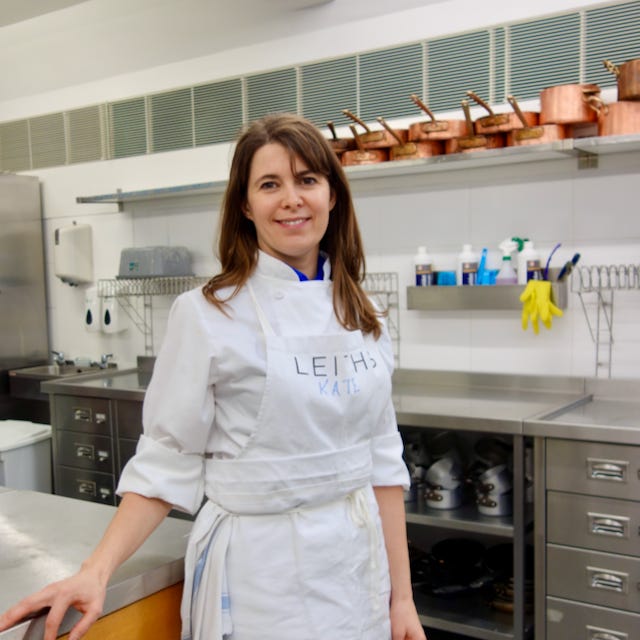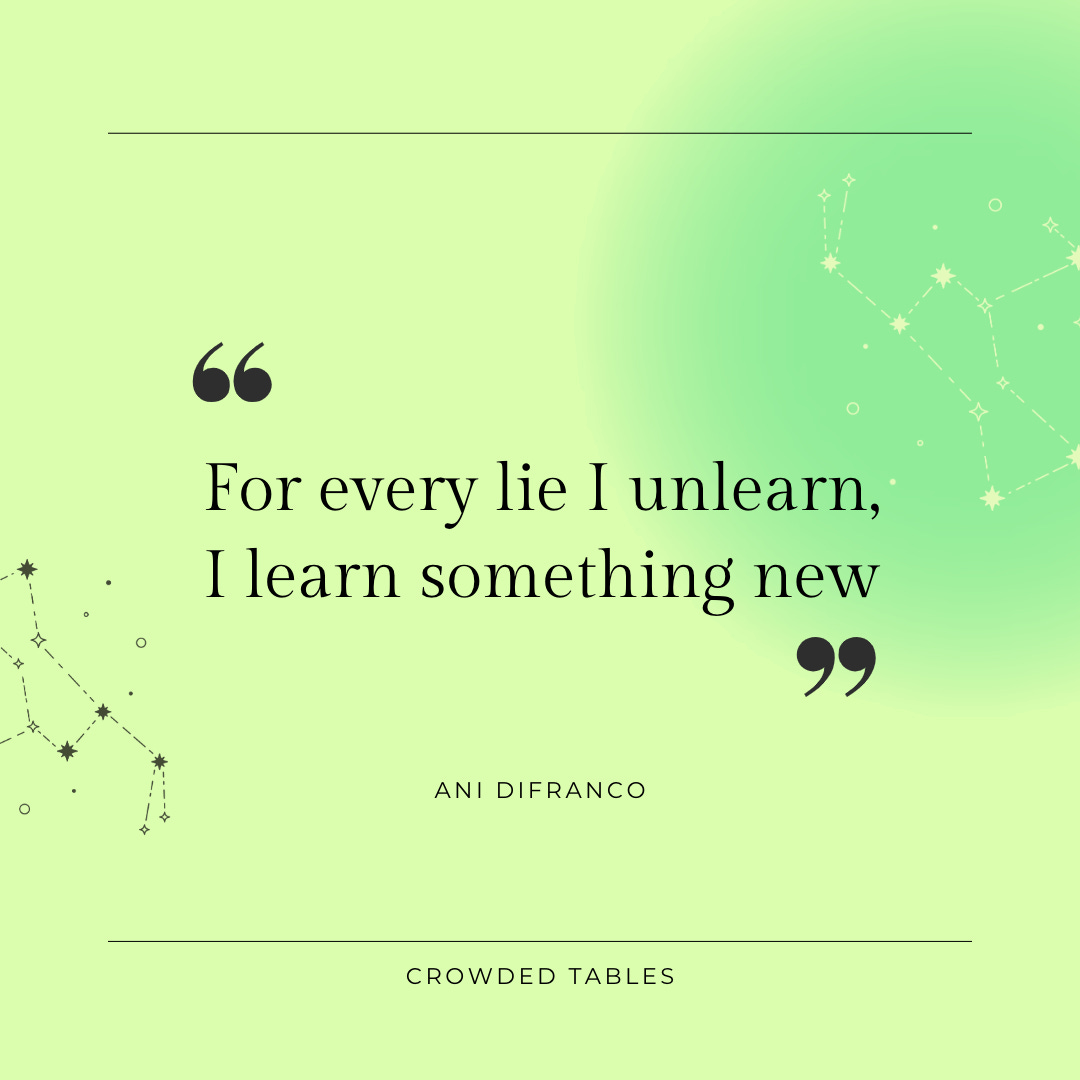Three years ago I found myself completely immersed in pursuing a nutrition certification. I say “found myself” because it really was a surprise. What started out as a question about how much protein my kids needed led to a deep rabbit hole that raised more and more questions. As a total research geek, the only way out for me was through. Then Covid hit, and it turned out the be an actual lifeline while the world was shut down.
This wasn’t my first plunge into the world of food. I have always loved to cook and loved the science of cooking. At an earlier career crossroads, I went to culinary school. It was one of the best years of my life. I was completely immersed in the history and methods of cooking and had the luxury of practicing and perfecting skills all day, every day. When I am cooking I am able to connect to that elusive feeling of flow. I am relaxed and creative and very much in connection with my own voice.
But none of this means I am always at ease with food. In fact, at times, my relationship to food has been fairly fraught. I have dieted. I have cleansed. I have been moralistic. I have ignored afternoon hunger with a cup of coffee. I’ve choked down disgusting shakes and squeezed in a 5am workout before an impossibly long work day. I have counted calories, I have counted macros and I have skipped meals.
In other words, I have always felt strong opposing forces around food. I lived with this push-and-pull for a very long time. The tension was so normal that it was also invisible.
So when I started studying nutrition, I think I was unaware that I was really seeking a solution to this conflicted relationship with food. If I could just understand the science, then I’d crack the code to enjoying food without fearing it. I did eventually find my answer. But as these stories go, the path and destination were different than I expected.
As you probably know, the central principle of weight loss science is an energy deficit. In other words: consuming fewer calories than are burned in a day is the only way to lose weight. This is basically down to Newton’s first law of thermodynamics: energy can neither be created nor be destroyed, it can only be transferred from one form to another.
But if there is only one way to lose weight, there are countless ways to “fail” to lose it. First and foremost, our bodies really don’t like to be in a sustained energy deficit. And biology has armed our bodies with tools to fight back against hunger, restriction and deprivation. When we are intentionally restricting calories, we are doing battle with our own body.
The worse news is that even if a diet results in weight loss, it is almost always a short term outcome. Studies show that the vast majority of people who lose weight on a diet gain the weight back and most of those gain back more than they lost. One of the strongest predictors of future weight gain is having recently been on a diet. And repeated dieting can make it increasingly difficult for your body to lose weight due to metabolic adaptation. The number of people who successfully keep weight off two years after a diet is under 5%.
I struggled to process this information. How could so much of what I thought I knew be so wrong? How could my nutrition classmates be planning to include weight loss services in their practices? Did they optimistically think they could figure out how to steer their clients into the elusive 5% even though no researcher has been able to figure out why that tiny minority is successful. How can weight loss companies push diets and shakes and supplements when the evidence for long term success is so clearly against them? The fact that weight loss is a $70B industry in the US and a $450B globally probably reveals that answer. But why are doctors still telling us to lose weight? Why are we all collectively feeding the weight loss industry juggernaut?
And personally, why was I mourning the futility of diets? How was I going to accept my body as it is without clinging to the hope that I will eventually find my way to flat abs?
I was churning with this frustration when I discovered the book Intuitive Eating by Evelyn Tribole and Elyse Resch. It is not an exaggeration to say that this book changed my life. (Don’t worry, the next newsletter will help explain what Intuitive Eating actually is.) It became very clear to me as I worked through their principles that I had been approaching things completely backward. I realized that my body is a living thing that needs food and nourishment every single day no matter what. My body wasn’t meant to be sculpted into each new aesthetic trend. It evolved as a precious and slightly magical place for me to spend my life and if I can just trust it, it will trust me back. Through this lens, I could see my body as the starting point, not an endpoint.
Along with my own newfound peace of mind (because that is actually where body image lives) I also felt really fucking angry about the lies that I had believed for so long. I was angry about the time and energy and self-esteem I wasted along the way. I was angry that I had believed my choices were limited to constant striving or disappointed settling when there were so many more options quietly on offer the whole time.
The main purveyor of this false choice is so-called “diet-culture.” It idealizes thinness and holds it up as a sign of health and moral value. Diet-culture promises us a sense of belonging and control. Diet-culture implicitly and explicitly warns us that if we veer too far away from that norm, we will be outsiders. It is so baked into our society that we consume it every day without even realizing it.
Diet culture is also sneaky. As straight-up dieting has become uncool, diet culture has gradually gone undercover as “health and wellness.” Now we fight inflammation, boost our immunity, balance our hormones, fast intermittently, or detox our bodies. But in practice, these are usually close cousins of weight loss with a glittery health halo. So much health messaging is now profit driven (as opposed to public health driven) that it’s become nearly impossible for the casual observer to figure out what is healthy. And the profit seekers have made a mint selling us the oversimplified lie that with the right diet and enough willpower, we can all be thin, and therefore healthy.
But the truth is that thinness doesn’t equal health and fat doesn’t equal illness. Health is determined by much more than nutrition and exercise. Body diversity is real and normal. Even if we all ate and exercised the same, we would still all be different shapes and sizes. And we would have a whole spectrum of health outcomes. There is literally not one single disease that only affects fat people.
Unfortunately, these aren’t just personal decisions. Diet culture causes actual harm. It overlaps with and feeds off of fatphobia and shows up in increasing rates of eating disorders and systemic anti-fat bias and weight stigma that undermines the health and dignity of those living in larger bodies.
I am not going to use this Substack to tell you how to eat. I truly believe that is entirely your choice. But I also believe that however each of us chooses to eat and move, we have the right to reliable information. We deserve better than outdated lies about how we need to look in order to have value or good health. We shouldn’t be gaslit into thinking our latest diet failure was from a lack of willpower. We are all worthy in the bodies we have today, right this minute.
I hope you’ll come with me on this journey. I plan to share my own story, what I have learned, and what is happening in the mixed-up worlds of food and health. I won’t be able to resist the occasional recipe. We’ll see where it leads us.




Love this part, screaming YES! “Did they optimistically think they could figure out how to steer their clients into the elusive 5% even though no researcher has been able to figure out why that tiny minority is successful. How can weight loss companies push diets and shakes and supplements when the evidence for long term success is so clearly against them? The fact that weight loss is a $70B industry in the US and a $450B globally probably reveals that answer. But why are doctors still telling us to lose weight? Why are we all collectively feeding the weight loss industry juggernaut? “ WHYYYYYYY. 😫😫
I am amazed that just 5% of people who diet are successful at keeping weight off two years — and that many gain back more than they lose.
I look forward to reading your thoughts on nutrition — I agree that we all deserve reliable information vs food hype!